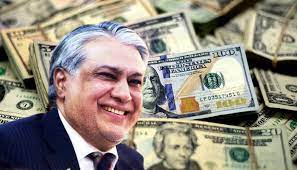Industrial and Commercial Bank of China releases US $ 300 million for Pakistan

Islamabad: The State Bank of Pakistan (SBP) has received back third and last disbursement in its account amounting to US $ 300 million from Industrial and Commercial Bank of China (ICBC), which will strengthen local foreign exchange reserves.
Earlier in the day, Minister for Finance and Revenue Senator Muhammed Ishaq Dar tweeted that “out of Chinese Bank’s ICBC approved facility of US $1.3 billion (which was earlier repaid by Pakistan), State Bank of Pakistan would receive back third and last disbursement today in its account amounting to $ 300 million. It will shore up forex reserves of Pakistan.”

Pakistan has announced financial support from the United Arab Emirates and China totalling $1.3 billion, giving the ailing economy a shot in the arm as it seeks to meet conditions for the resumption of an International Monetary Fund bailout.
China released US $300 million to Pakistan – the last tranche of a $1.3 billion rollover loan.
Pakistan had signed a US $ 6.5 billion bailout package with the International Monetary Fund (IMF) in 2019, but has repeatedly reneged on conditions and so far just US $ 3 billion has been released.
Pakistan’s economy has crumbled alongside a simmering political crisis, with the rupee plummeting and inflation at decades-high levels.
Finance Minister Ishaq Dar said on Friday that the United Arab Emirates (UAE) had promised US $ 1 billion to prop up Pakistan’s forex reserves – which at their current level of $4.04 billion can barely pay for four weeks of imports.
“UAE authorities have confirmed to IMF for their bilateral support of US $ one billion to Pakistan,” Dar tweeted. He added that the country’s central bank was preparing the documentation to receive the deposit.
The IMF insists the nuclear-armed nation of 220 million people must boost its pitifully low tax base, end tax exemptions for the export sector, and raise artificially low petrol, electricity and gas prices meant to help low-income families.
The country’s hopes for another round of IMF funding also depend on friendly countries rolling over existing loans or providing additional support.
Pakistan’s national debt, currently US $ 274 billion, or nearly 90 percent of Gross Domestic Product (GDP) makes Pakistan particularly vulnerable to economic shocks.





